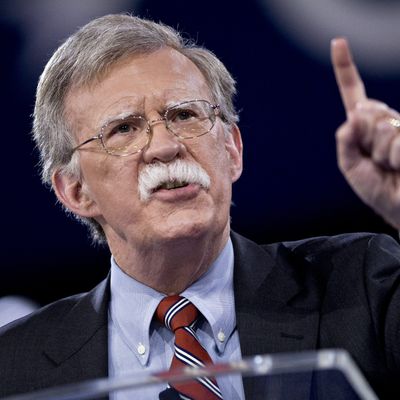
From the outset of his presidency, to which he was elevated with barely any preparation, Donald Trump was surrounded by a protective cordon of advisers, as a child monarch might. In return for absorbing his tantrums, they would educate their unsteady charge, who would wind up, after pratfalls and drama, inflicting no more ruin on the country than a normal modern Republican president might. (Which, to be sure, is quite a bit of ruin). Somehow it seemed we might muddle through.
Now Trump is breaking through the protective cordon. The people who joined the government to save Donald Trump from himself, or to save the world from Trump, are leaving. Gary Cohn and Rex Tillerson are gone. Trump is reorganizing his legal team, mobilizing for war against the special counsel. And now he has finally cast off his most important minder, National Security Adviser H.R. McMaster, and replaced him with John Bolton.
Bolton is in some ways the foreign-policy analogue of his domestic counterpart, Lawrence Kudlow, the incoming head of the National Economic Council. Like Kudlow, Bolton is a true-believing ideologue firmly encamped on his party’s right flank, who appears regularly on Fox News to propound ultrasimplistic solutions to the world’s problems, which Trump can easily grasp on his sofa. Also like Kudlow, Bolton has given every indication of being personally committed to Trump, and has not condescended to him.
The difference, however, is that Kudlow’s kooky ideas have little chance of enactment given the tenuous Republican control of Congress. Bolton’s foreign-policy notions can be quickly operationalized, given the near-total command the Executive branch has over foreign policy. What’s more, those ideas have the potential to kill large numbers of people.
Bolton has long been estranged from a substantial segment of his own party, which regards him as dangerous. He served as undersecretary of State for arms control in the Bush administration, and while many of his colleagues came away at least somewhat chastened by their errors, Bolton did not. “I still think the decision to overthrow Saddam was correct,” he said in 2015. Bolton spent the end of the Bush administration bitterly criticizing its pragmatic turn, as figures like Defense Secretary Donald Rumsfeld were replaced by moderates like Robert Gates, and vice-president Dick Cheney began losing some internal battles. Bolton likewise attacked Bush as dangerously weak on North Korea: “Not only was [policy] moving in the wrong direction, it was going to continue in the wrong direction no matter what I did.”
In 2005, several Republican senators joined Democrats to block Bolton from an appointment as ambassador to the United Nations, a rare rebuke. (Bush then appointed Bolton during a Senate recess.) After the 2016 election, when Bolton sought a position within the State Department, Republican foreign-policy veterans again rallied to block him.
Bolton is considered so dangerous, even by many Republican hawks, because he is a true believer, deeply in the grips of black-and-white notions of simple morality that are difficult to reconcile with the messy reality that is the world. There is a long history of ideologues joining a presidential administration and terrifying the establishment, only to be assimilated into its bureaucratic routines. But Bolton’s character and history seem to defy any such domestication. During his time in the administration, he not only ignored but bullied staffers who presented analyses that questioned his prior assumptions. His brain is impervious to complication.
The combination of Bolton and Trump poses an especially potent danger. Trump once declared “I love war, in a certain way.” Both men think in terms of zero-sum conflict and harbor an obsession with dominating their adversaries. They are temperamental twins. In North Korea or elsewhere, Bolton could goad Trump into dangerous reaction. Some people fooled themselves into believing Trump would govern as a dove of some kind. But any dovish impulses he had were a product of his lack of control over the government. Trump might dismiss the use of power by people who aren’t Trump, but is not inclined to be shy about wielding power that he commands himself.
The great danger of a Trump presidency has never been the things that are the most likely to happen. It has been the tail risks — any number of low-probability, high-impact events that are far more likely to occur with an authoritarian buffoon in the White House than under a normal president. Trump has spent his presidency surrounded by people who were at least attempting to contain these risks — say, a constitutional crisis, or a meltdown of the international order. As awful and comically surreal as the first year and a quarter of his term has been, after Trump has taken full command of his administration, we may see it as a golden age.






























